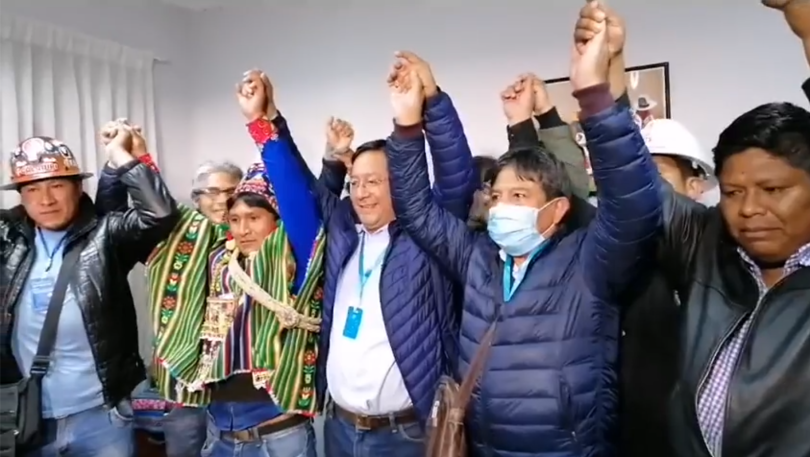
Luis Arce, candidate of the party of ousted president Evo Morales, has seemingly swept to victory in Bolivia’s Oct. 18 presidential elections. While the official count is technically still pending, results place him with more than 50% of the vote—well above the second-place center-right contender Carlos Mesa and with far more than the required majority to avoid a runoff. This represents a significant recoup of losses for the Movement Toward Socialism-Political Instrument for the Peoples’ Sovereignty (MAS-IPSP), which Morales nominally still leads from exile in Argentina. As news of the victory broke, supporters gathered outside Arce’s campaign office to chant “The pollera will be respected!”—a reference to the traditional skirt that has become a symbol of the MAS-IPSP indigenous base. But Arce is insisting there will be “no role” in his government for Morales, who has been barred by the courts from holding public office and faces criminal charges in Bolivia.
As finance minister under Morales, Arce presided over one of the fastest-growing economies in the region. But when he assumes the presidency, he will be taking over a country debilitated by deep recession. “We will have to have austerity measures. There’s no other option if we don’t have enough income to cover our current expenditures,” Arce admitted to reporters.
This could cost Arce support from his party’s base, and the MAS-IPSP seems divided on the legacy of Morales. Angélica Ponce, leader of the Confederation of Women of Intercultural Communities of Bolivia and a longtime party militant from Morales’ home region of Cochabamba, called for a clean break with figures from his administration. She said that his cabinet ministers had “misled” the MAS-IPSP and should not be invited to return to the government (despite the fact that Arce himself is a former Morales minister).
“We no longer want people who have misused the Political Instrument for the Sovereignty of the Peoples, and our brother Luis Arce clarified during the campaign that the former ministers will not return. None,” Ponce said. “We are going to sift the wheat from the chaff. We want worthy men in the administrative, organizational and political structure.”
The inauguration of the new president must take place between Oct. 31 and Dec. 30, and there are obvious concerns about potential moves to destabilize the situation by the right-wing interim president, Jeanine Añez. Her initial reaction to Arce’s victory was to publicly recognize it and to fire her interior minister, Arturo Murillo—a hardliner who had repeatedly overseen deadly repression of MAS-IPSP supporters, and labelled them “terrorists” and “animals.” But one day after the vote, Áñez reversed herself and brought Murillo back into her cabinet. (Al Jazeera, ABI, Bolivia Prensa, Prensa Latina, WaPo, NYT)
Environmental as well as economic conerns will pose challenges for the Arce government. The impressive growth he oversaw as finance minister was driven by foreign investment in resource extraction—with ecological impacts that had alienated elements of the MAS-IPSP base. The devastating Amazon forest fires that helped spur protest against Morales last year have returned, prompting Añez to declare a state of emergency just a week before the election. In August, the International Tribunal on the Rights of Nature held an online trial on the issue, finding both Morales and Añez guilty of “ecocide.” (Reuters, Blog Verde Bolivia)
Image via Carwil without Borders





Bolivia: judge cancels Morales arrest warrant
A Bolivian judge sitting in La Paz on Oct. 26 canceled a warrant for exiled former president Evo Morales. Morales, who has been in exile for more than a year in Mexico and then Argentina, will now be able to return to Bolivia without fear of arrest. (Jurist)
Rapid changing of the guard in Bolivia
Bolivia’s Legislative Assembly, where the MAS holds a majority, has voted to call for “genocide” charges to be brought against Jeanine Añez after she steps down as interim president next week. Evo Morales meanwhile announced that he will be returning to Bolivia after Arce is sworn in. (InfoLibre, Opinión)